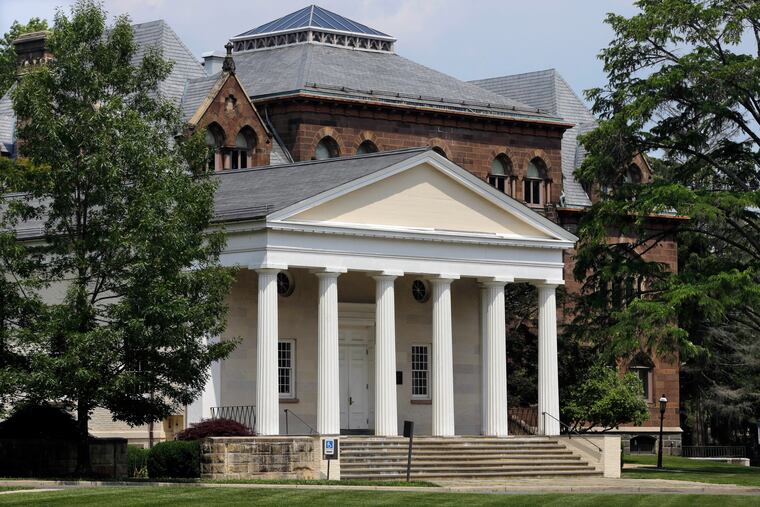Princeton Theological Seminary pledges $27 million reparations plan
Despite plans to launch new scholarships, some students and graduates say the seminary has only made a "good start."

Princeton Theological Seminary has set aside $27.6 million for a reparations plan to “repent” for its past ties to slavery.
The money will be used to fund scholarships and provide “cross-cultural” changes to its curriculum as part of a multiyear plan of action, officials said in a statement.
“The Seminary’s ties to slavery are a part of our story," Princeton Seminary president M. Craig Barnes said in the Oct. 18 announcement. “It is important to acknowledge that our founders were entangled with slavery and could not envision a fully integrated society.
"We did not want to shy away from the uncomfortable part of our history and the difficult conversations that revealing the truth would produce.”
Although the seminary, founded in 1812, did not own slaves, it has conceded after a two-year study that it benefited from a slave economy through investments in Southern banks, as well as donations from wealthy men who profited from slavery. Among one of the findings in the report dated October 2018: The seminary’s founding faculty and officials supported the American Colonization Society campaign to send freed African Americans to Liberia rather than accept them as equal citizens in the United States.
The announcement puts the seminary in the forefront of a national debate on reparations to atone for America’s nearly 250-year history of slavery.
Earlier this year, students at Georgetown University voted to pay an additional $27.20 fee per semester for a reparations fund to benefit the descendants of 272 enslaved Africans sold in 1838 by the Jesuits who ran the school in order to keep the university afloat.
The Princeton announcement followed pressure from students, especially the Association of Black Seminarians, whose members organized town-hall meetings, held protests, and circulated petitions demanding reparations for the institution’s slavery connections.
Seminary officials said the board of trustees has unanimously endorsed the plan.
Among its initiatives:
Award at least 30 new scholarships that cover full tuition, plus $15,000 “for students who are descendants of slaves" or are from “underrepresented groups.”
Rename the seminary library after Theodore Sedgwick Wright, the first African American to attend and graduate from Princeton Seminary in 1829.
Hire a full-time director for the Center for Black Church Studies and rename the center after Betsey Stockson, a formerly enslaved woman who had been owned by the chairman of the seminary’s board of trustees, former Princeton president Ashbel Green. Stockton eventually worked as an educator in Princeton, Philadelphia, and Hawaii.
>>READ MORE: Black students at Princeton Theological Seminary demand reparations for school’s ties to slavery
Both the current and former president of Princeton’s Association of Black Seminarians acknowledged the school’s efforts.
“I cannot say that as an institution, the seminary has failed in its responsibility to try to repent," said Nicholas Young, a seminary senior and the president of ABS.
But Young noted that the seminary, by its own admission, has said that between 15% to 35% of its $1 billion endowment can be linked to slavery.
“We have asked that at least 15 percent of the endowment be earmarked for reparations," he said. "That would be $147 million. ...Only 10 percent of what we asked for is being addressed in this response.”
Justin Henderson, a 2019 seminary graduate, applauded the move to rename the library, but had other concerns. Students had demanded loan forgiveness, and why would the scholarships include other “underrepresented groups,” instead of just the descendants of slaves?
“We have operated under the banner of substance, not symbols," said Henderson, an associate minister at the First Baptist Church of Lincoln Gardens in Somerset, N.J. “Symbols are good, but they can’t stand alone without real progress."
Anne Stewart, vice president for external affairs at the seminary, said the scholarships were structured based on federal requirements, which prevented officials from limiting recipients to racial and ethnic groups.
However, she said, “The intent of the scholarships is to focus on African American students.”
Stewart said that a seminary task force spent a year talking with the community, students, and alumni after the report, Princeton Seminary and Slavery, was released last year.
In response to criticism that $27.6 million wasn’t enough, Stewart said:
“The idea from the very beginning didn’t start with a dollar amount in mind, but what would foster meaningful and lasting change in the community.”
This story was updated to correct the amount of the money awarded to individual students in addition to the full scholarship.